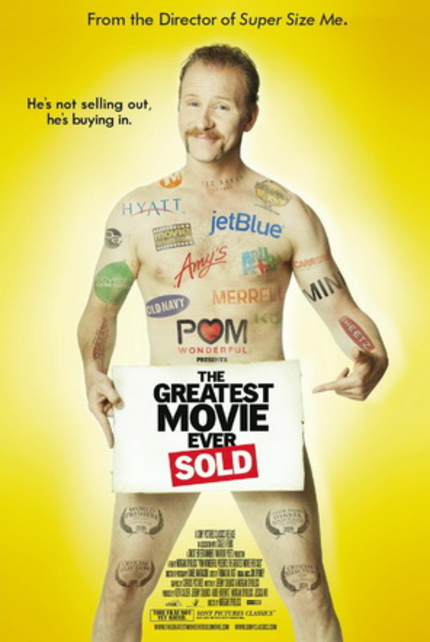POM Wonderful Presents THE GREATEST MOVIE EVER SOLD

Like Michael Moore, Morgan
Spurlock has forged a career as a documentarian by putting himself front
and center--therefore, as with Moore, the question of whether one likes
his work often comes down to whether one likes the man himself. Tackling
lighter-weight subject matter than Moore and coming across as more personable,
Spurlock has carved out a comfortable niche for himself in the contemporary
film scene--one that The Greatest Movie Ever Sold threatens
to undermine by forcing us to take him more seriously than he takes
himself.
If it seems that I'm already
falling into the same trap of putting Spurlock's personality ahead
of the work itself, yep, guilty as charged. Yet in my defense I should
point out that early on in The Greatest Movie Ever Sold the filmmaker
is asked to consider his own "brand" insofar as the doc's potential
sponsors--the courting of which provides the narrative backbone here--need
to gauge how it might fit with their own. The resultant analysis, which
contends that Spurlock is equally "playful" and "mindful" (like
Apple's brand), happens to describe the tone of the picture as well.
It's also far more generous than my previous characterization of Spurlock's
brand: paradoxically edgy-yet-middlebrow.
When Spurlock confesses that
he'd like this movie to be the Iron Man of doc-based brand
integration, there's of course some sly humor at work
but also an element of confession. Spurlock has big ambitions, and isn't
afraid to be a front man for himself, his ideas, or for his partners
and allies. The nice thing is that the premise of The Greatest Movie
Ever Sold allows him to take us along for the ride as he meets both
success and failure on the road to selling himself--and, just possibly,
to selling himself out. It's this combination of self-awareness, a
peeling-back-the-curtain strategy on how media is financed, and an overall
air of self-reflexivity ("This is the movie right now," remarks
one meta-immersed corporate exec as the truth dawns on him) that make
The Great Movie Ever Sold so mesmerizing.
Of course the fast pace, density
of ideas, stellar line-up of talking heads, and engaging presentation
(upbeat animation and music, as you'd expect) don't hurt. Film buffs
will also appreciate the presence of Quentin Tarantino, J.J. Abrams,
Brett Ratner, Peter Berg, and others--all of whom have their own takes
on product placement that's revealing, both about the industry and
themselves; they're not simply used as celebrity window dressing.
As proof of Spurlock and co-writer Jeremy Chilnick's sober, social-minded
intent here, the film explores the place of advertising more generally
in our lives and even includes the author of Consuming Kids as
well as usual suspects such as Nader and Chomsky. Some might argue that
the film ultimately only scratches the surface in this respect, and
they'd be right--I just can't find fault with the filmmakers on
this level as such reaching seems necessary to provide greater cultural
context for the topic. Moreover, I found that Spurlock explores these
deeper waters in just the right proportion: not simply making
a glib gesture in the general direction of social consciousness--a
toe-dipping--nor flailing around helplessly as he finds himself in
over his head intellectually.
But I invite you to check out
The Greatest Movie Ever Sold and decide for yourself. First, however,
a couple of disclaimers...
Disclaimer 1: My Bias
I'm a "media literacy" guy, so I find the subject matter of the film intensely interesting--and I think parts of it could prove to be valuable teaching tools in the classroom. I particularly like how it might encourage young people to view media through a critical lens but doesn't project a fussy, pop-culture-is-bad for-you kind of self-righteousness. If you don't care much about such issues I can see your reaction to The Greatest Movie Ever Sold being more lukewarm.
Disclaimer 2: Selling Out
In a sense I was bought off, too: the swag bag that Sony provided critics after the screening included many of the products featured in The Greatest Movie Ever Sold, such as a refreshing bottle of POM Wonderful, a vial of Ban deodorant, a coupon for an Amy's frozen entrée, and a sample of Mane and Tail dual equine/human hair conditioner. For these riches I suppose I was expected to produce one of the 600,000 "media impressions" that one of the sponsor contracts stipulated as a requirement for participation. So my question is, Morgan, if I write about the film again, can I get some more conditioner? My kids love it.






